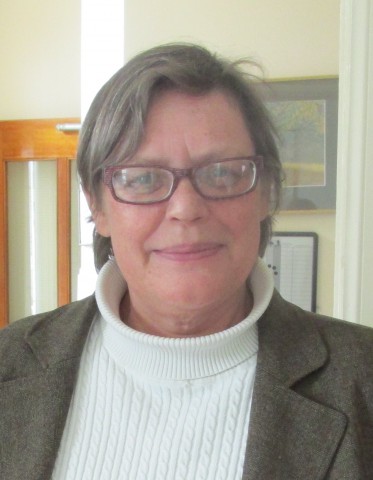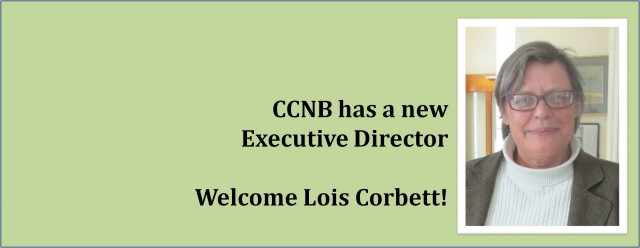A Conversation with Lois Corbett
by Stephanie Coburn, President

The Board of the Conservation Council is very pleased to welcome our new Executive Director, Lois Corbett. Lois comes to us with great environmental and organizational credentials. Lois has had her own consulting firm in Toronto, providing strategic advice to Canada’s green energy sector and to environmental groups across Canada. Her strengths certainly include the development of sound public policy on issues that CCNB has been working on for decades: toxics, wetlands, forestry, water, climate change, energy, and fisheries.
She has a long history of working successfully with Provincial and Municipal governments. Before starting her own firm, Lois worked as Senior Policy Advisor to three Ministers of the Environment in Ontario, providing advice on a number of pieces of environmental legislation, including the Endangered Species Act, Clean Water Act, the Greenbelt Act, and the Green Energy Act, among others.
Lois has experience building and running environmental organizations: she was the Executive Director of the Toronto Environmental Alliance (TEA) for ten years. TEA is an NGO focused primarily on developing progressive environmental public policy, and she helped Toronto City Council adopt its Smog Action Plan, Climate Change Action Plan, Waste Diversion Plan, and the ban on the use of cosmetic pesticides. At TEA, Lois also successfully developed the campaign that saw provincial political parties commit to phase out coal-fired electricity in Ontario.
During that period, Lois also served as the first Executive Director of the Toronto Atmospheric Fund, assisting the foundation in waging an effective campaign against its dissolution following amalgamation of the municipalities of Greater Toronto. She was able to identify its core constituency and help the group develop its first long term strategic plan.
Most recently, Lois was named as one of the Broadbent Institute’s Leadership Fellows, who are a “talented and diverse group of 18 leaders from across the country who have agreed to share their expertise and experiences with the next cohort of progressive Canadian leaders.”
Lois has been an environmental activist for a long time; in fact, her first job in the environmental movement was at the Conservation Council of New Brunswick in 1984 where she was employed as a summer student. She holds a Bachelor of Arts from Saint Thomas University. She is originally from Johnsville, New Brunswick, where her father still spends part of his year on the family farm.
During a recent conversation, Lois was able to share some of her hopes and expectations for returning home:
Why are you excited to be coming back to New Brunswick?
I am very excited about coming back home. I have been away FAR too long, and even though I go to NB every summer, I miss the rivers, the ocean, the beautiful landscape and the peace and quiet of the picture province. It feels like completing a circle – I first worked as an environmentalist at CCNB in the summer of 1984, and after years of working to reduce pollution in other provinces, I’d like to work with the fun, witty, hard-working people of NB to help continue to preserve our precious water and land. I believe that direct engagement in the natural world and strong connections to community inspire people to address environmental challenges through positive environmental action, and I see those values demonstrated every day in NB.
What do you think the role of the Conservation Council is and should be?
CCNB is recognized across the country as one of the founding members of the country’s conservation and environmental movements. It has served the province well over the past 45 years in its key roles of watchdog, promoter of sound public policy, and enthusiastic community building. I feel very privileged to be asked to come and work for a group with such dedicated and thoughtful board members, staff and volunteers. I think CCNB should continue providing these essential functions to the people of NB, and offer them positive, caring ideas about how to achieve environmental progress.
What would you like to accomplish at the Conservation Council?
Working with others to advance key public priorities to protect land, air and water as well as people’s involvement in community environmental education will be job one. I would also, with the help of the able Board members and key volunteers, like to nurture and grow the organization — to help forge its own path of sustainability. Finally, I am concerned about how our scientific experts are being shut out of policy developments, whether it’s sustainable forest planning, gas extraction or shoreline protection, to mention only a few issues. This is not unique to NB of course, but I would like to explore with CCNB increased opportunities for collaboration with scientists and policy experts.
You can also listen to a recent interview with Terry Seguin of CBC’s Information Morning Fredericton

